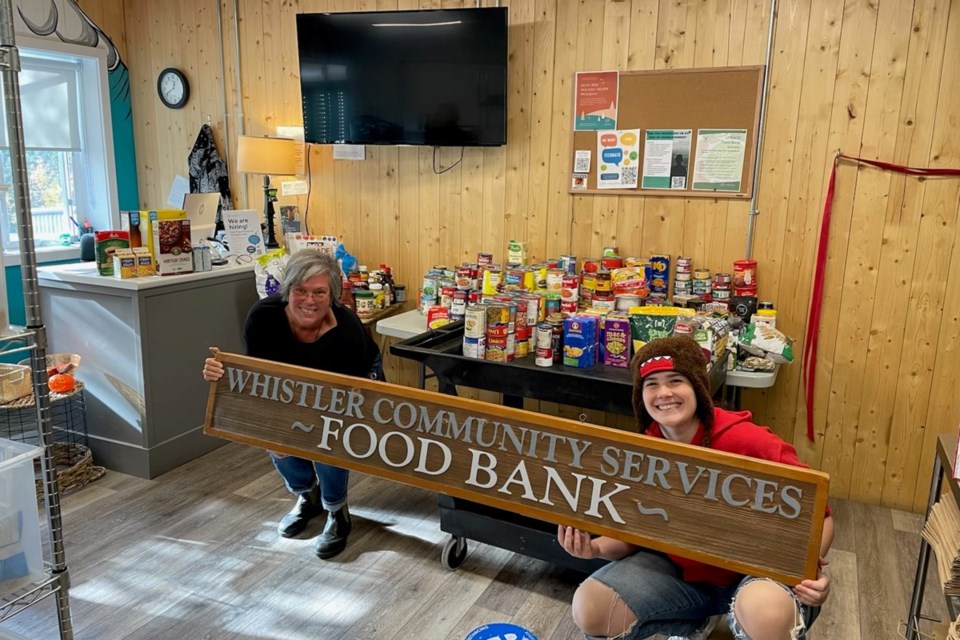The Whistler Community Foundation (WCF) is dipping into its longstanding emergency fund to donate much-needed funds to the Whistler and Pemberton food banks, both of which have continued to see high demand since a pandemic surge.
The two food banks will split $5,000 from the WCF’s emergency fund, which was created in 2005 to allow the organization to respond quickly to local needs outside of the regular granting cycles. The WCF acts as the steward of money gifted to the community, and provides grants in the areas of environment, arts and culture, social service, and education.
Because the emergency fund is not permanently endowed like the WCF’s other funds, it is set up to be used on short notice and was commonly handed out to support individuals or groups through a local charity that then arranges assistance in the case of, say, a house fire.
“We recognize that a gift of $5,000 to the affected communities of Whistler and Pemberton is not enough to resolve food insecurity. Especially, when food banks across the country are experiencing unprecedented visits,” said Claire Mozes, CEO of the WCF, in a release. “And yet, we hope this action signals to the communities that at this very moment in time their neighbours need support, as do the charities who provide emergency food assistance.”
Both communities’ food banks saw usage skyrocket as COVID-19 took its toll on employment rates and food security. Jackie Dickinson, executive director of the Whistler Community Services Society (WCSS), operator of Whistler’s food bank, told Pique demand is on par or higher now than at the onset of the pandemic in March 2020. Prior to that time, a busy month would see the food bank distribute goods 250 times. Now, hitting the 250 mark typically takes just two days. Open for three hours on Mondays, Wednesdays, and Fridays, the Whistler Food Bank now averages 160 unique visitors a day, Dickinson said.
“People come up and ask me if there is still really a need. Sadly, there’s a greater need now than when the world changed for everyone,” she added.
A follow-up question Dickinson often gets is: Who are all these people?
“It’s everybody. It’s across the board,” she said. “I really don’t think it discriminates in any way, and what I’ve been saying a lot is we obviously have concern and care for the people coming in to access service—but that’s also not determining true need. What keeps me up at night are the people that may not be coming in.”
The Pemberton Food Bank is experiencing similarly high demand. At the start of the pandemic, demand rose 169 per cent, and has remained high ever since. These days, 1,420 people access the food bank on average every month, including 419 families. Of those served, nearly a third are children, and 63 per cent identify as Indigenous.
“There is a perfect storm of factors affecting food security in Pemberton and the surrounding areas,” said Sea to Sky Community Services, operator of the Pemberton Food Bank, in the release. “Inflation is fuelling a high need while also driving up operating costs for food banks. In Pemberton, this means less money to purchase fresh food and higher rent costs.”
Although a number of factors contribute to food insecurity, Dickinson was clear that, like food banks in much of the country, the prime reason people now find themselves accessing their services should come as no surprise to locals.
“Safe, affordable housing is crucial to hunger and mental health, and so there’s lots of money being raised to support it, but we know the people visiting us and getting support from us are often housing-insecure,” she explained.
Dickinson added there is a particular need to affordably house Whistlerites without permanent residency status.
“We need to create the inventory for individuals on closed work permits who are not eligible at this time for permanent residency. That will be the way to tackle the lineups we’re currently seeing,” she said. “If we’re only increasing inventory throughout the province for people who have permanent residency, we’re still going to see an increase in need. It’s really disheartening to hear that people with secure work are experiencing housing insecurity.”
As always, given the food banks’ respective purchasing power, cash donations tend to stretch farther than non-perishable items. Both the Whistler and Pemberton food banks recently wrapped fundraising campaigns, but there is still a great need to keep the shelves full as we head into the holidays.
To donate, and learn more, visit mywcss.org/food-security for the Whistler Food Bank, and sscs.ca/pemberton-food-bank for the Pemberton Food Bank. You can also donate to the WCF at whistlerfoundation.com.




